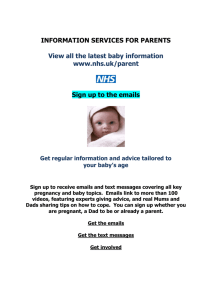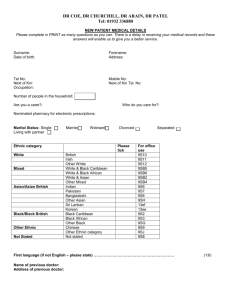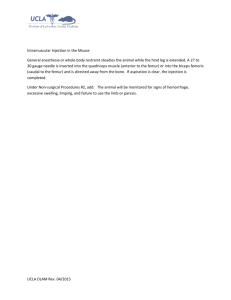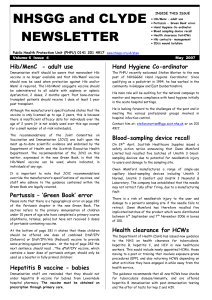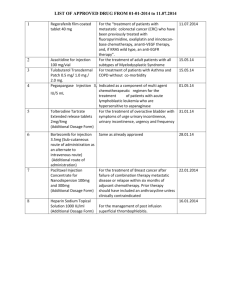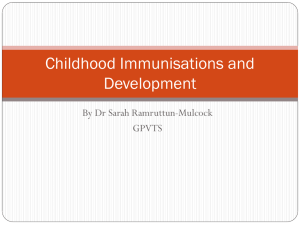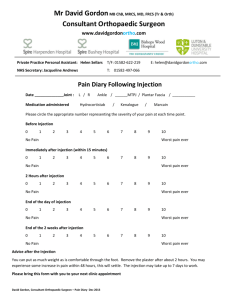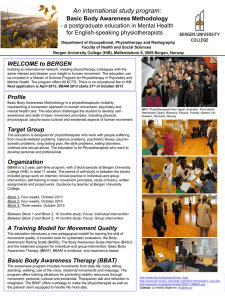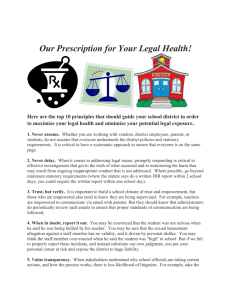Immunisation Factsheet
advertisement
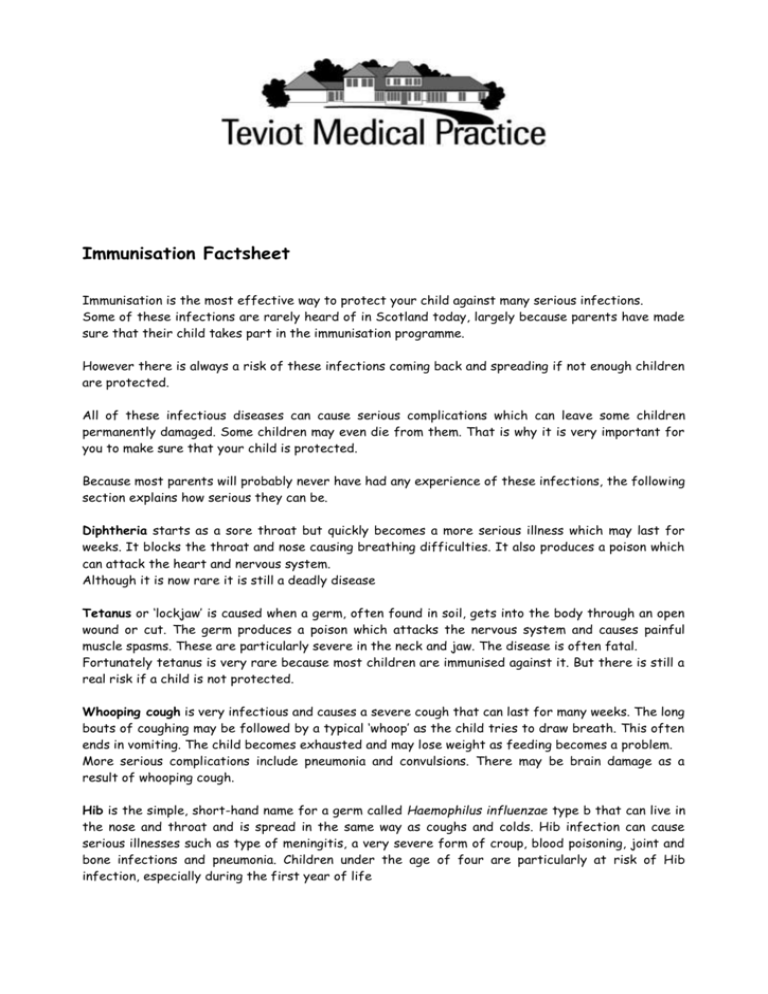
Immunisation Factsheet Immunisation is the most effective way to protect your child against many serious infections. Some of these infections are rarely heard of in Scotland today, largely because parents have made sure that their child takes part in the immunisation programme. However there is always a risk of these infections coming back and spreading if not enough children are protected. All of these infectious diseases can cause serious complications which can leave some children permanently damaged. Some children may even die from them. That is why it is very important for you to make sure that your child is protected. Because most parents will probably never have had any experience of these infections, the following section explains how serious they can be. Diphtheria starts as a sore throat but quickly becomes a more serious illness which may last for weeks. It blocks the throat and nose causing breathing difficulties. It also produces a poison which can attack the heart and nervous system. Although it is now rare it is still a deadly disease Tetanus or ‘lockjaw’ is caused when a germ, often found in soil, gets into the body through an open wound or cut. The germ produces a poison which attacks the nervous system and causes painful muscle spasms. These are particularly severe in the neck and jaw. The disease is often fatal. Fortunately tetanus is very rare because most children are immunised against it. But there is still a real risk if a child is not protected. Whooping cough is very infectious and causes a severe cough that can last for many weeks. The long bouts of coughing may be followed by a typical ‘whoop’ as the child tries to draw breath. This often ends in vomiting. The child becomes exhausted and may lose weight as feeding becomes a problem. More serious complications include pneumonia and convulsions. There may be brain damage as a result of whooping cough. Hib is the simple, short-hand name for a germ called Haemophilus influenzae type b that can live in the nose and throat and is spread in the same way as coughs and colds. Hib infection can cause serious illnesses such as type of meningitis, a very severe form of croup, blood poisoning, joint and bone infections and pneumonia. Children under the age of four are particularly at risk of Hib infection, especially during the first year of life Polio attacks the nervous system, causing paralysis of the muscles. If it affects the breathing muscles it may be fatal. When it affects other muscles, such as in the arms or legs, they can become paralysed, sometimes permanently. Meningitis group C bacteria can cause meningitis which is inflammation of the membranes covering the brain, or septicaemia (blood poisoning). Meningitis and septicaemia are the main causes of death from infection in children and young people. Meningitis C bacteria are not the only cause of meningitis. Measles is very infectious. It begins like a bad cold, then the child develops a fever and rash and is often very unwell. Measles can be more serious than many people think and can cause ear infections, bronchitis and pneumonia, convulsions, brain damage and blindness. Children can die from measles. Mumps is an infection that causes a painful swelling of the salivary glands in the face. More seriously it can lead to meningitis, brain damage and deafness. It can also cause inflammation of the testicles, which may result in sterility. Rubella is a mild disease in children but can be very serious if a pregnant woman who has not been immunised comes into contact with the disease, particularly during the first three to four months of her pregnancy. It can result in many severe defects in the unborn child, including deafness, blindness, heart conditions and brain damage. Pneumococcal Infection usually lives harmlessly in the back of peoples throats and is one of the most common bacterial causes of ear infection, however it can cause very serious illness such as meningitis, pneumonia and blood poisoning. Consent Form IMMUNISATION SCHEDULE When to immunise Two months old What vaccine is given How it is given Diptheria, tetanus, pertussis (whooping cough), polio and Hib (DtaP/IPV/Hib) One injection Pneumococcal One injection Diptheria, tetanus, pertussis (whooping cough), polio and Hib (DtaP/IPV/Hib) One injection Men C One injection Diptheria, tetanus, pertussis (whooping cough), polio and Hib (DtaP/IPV/Hib) One injection Pneumococcal One injection Men C One injection Around 12 months old Hib/Men C One injection Around 13 months old Measles, mumps and rubella (MMR) One injection One injection Three months old Four months old Pneumococcal Three years four months to five years old 13 – 18 years old Diptheria, tetanus, pertussis and polio (dTaP/IPV or DtaP/IPV) One injection Measles, mumps and rubella (MMR) One injection Tetanus, diphtheria and polio (Td/IPV) One injection You will be give NHS Scotland guides to the national immunization programme. Please read these booklets which provide up to date information about the vaccines IMMUNISATION CONSENT I am the parent / guardian of ……………………………………………………….. D.O.B………………………………I have read the NHS Scotland guide to immunisation booklet along with the Teviot Medical Practice immunization factsheet and consent to him/ her receiving immunization, following the national schedule. Signature of Parent………………………………………………………………………………..
